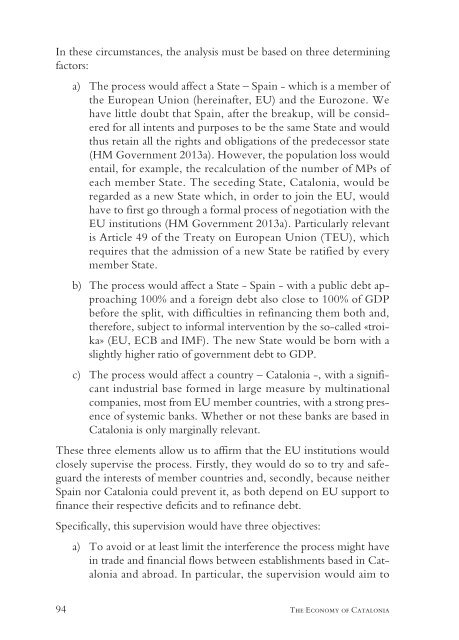The Economy of Catalonia
the_economy_of_catalonia._questions_and_answers_on_the_economic_impact_of_independence
the_economy_of_catalonia._questions_and_answers_on_the_economic_impact_of_independence
You also want an ePaper? Increase the reach of your titles
YUMPU automatically turns print PDFs into web optimized ePapers that Google loves.
In these circumstances, the analysis must be based on three determining<br />
factors:<br />
a) <strong>The</strong> process would affect a State – Spain - which is a member <strong>of</strong><br />
the European Union (hereinafter, EU) and the Eurozone. We<br />
have little doubt that Spain, after the breakup, will be considered<br />
for all intents and purposes to be the same State and would<br />
thus retain all the rights and obligations <strong>of</strong> the predecessor state<br />
(HM Government 2013a). However, the population loss would<br />
entail, for example, the recalculation <strong>of</strong> the number <strong>of</strong> MPs <strong>of</strong><br />
each member State. <strong>The</strong> seceding State, <strong>Catalonia</strong>, would be<br />
regarded as a new State which, in order to join the EU, would<br />
have to first go through a formal process <strong>of</strong> negotiation with the<br />
EU institutions (HM Government 2013a). Particularly relevant<br />
is Article 49 <strong>of</strong> the Treaty on European Union (TEU), which<br />
requires that the admission <strong>of</strong> a new State be ratified by every<br />
member State.<br />
b) <strong>The</strong> process would affect a State - Spain - with a public debt approaching<br />
100% and a foreign debt also close to 100% <strong>of</strong> GDP<br />
before the split, with difficulties in refinancing them both and,<br />
therefore, subject to informal intervention by the so-called «troika»<br />
(EU, ECB and IMF). <strong>The</strong> new State would be born with a<br />
slightly higher ratio <strong>of</strong> government debt to GDP.<br />
c) <strong>The</strong> process would affect a country – <strong>Catalonia</strong> -, with a significant<br />
industrial base formed in large measure by multinational<br />
companies, most from EU member countries, with a strong presence<br />
<strong>of</strong> systemic banks. Whether or not these banks are based in<br />
<strong>Catalonia</strong> is only marginally relevant.<br />
<strong>The</strong>se three elements allow us to affirm that the EU institutions would<br />
closely supervise the process. Firstly, they would do so to try and safeguard<br />
the interests <strong>of</strong> member countries and, secondly, because neither<br />
Spain nor <strong>Catalonia</strong> could prevent it, as both depend on EU support to<br />
finance their respective deficits and to refinance debt.<br />
Specifically, this supervision would have three objectives:<br />
a) To avoid or at least limit the interference the process might have<br />
in trade and financial flows between establishments based in <strong>Catalonia</strong><br />
and abroad. In particular, the supervision would aim to<br />
94 <strong>The</strong> <strong>Economy</strong> <strong>of</strong> <strong>Catalonia</strong>


